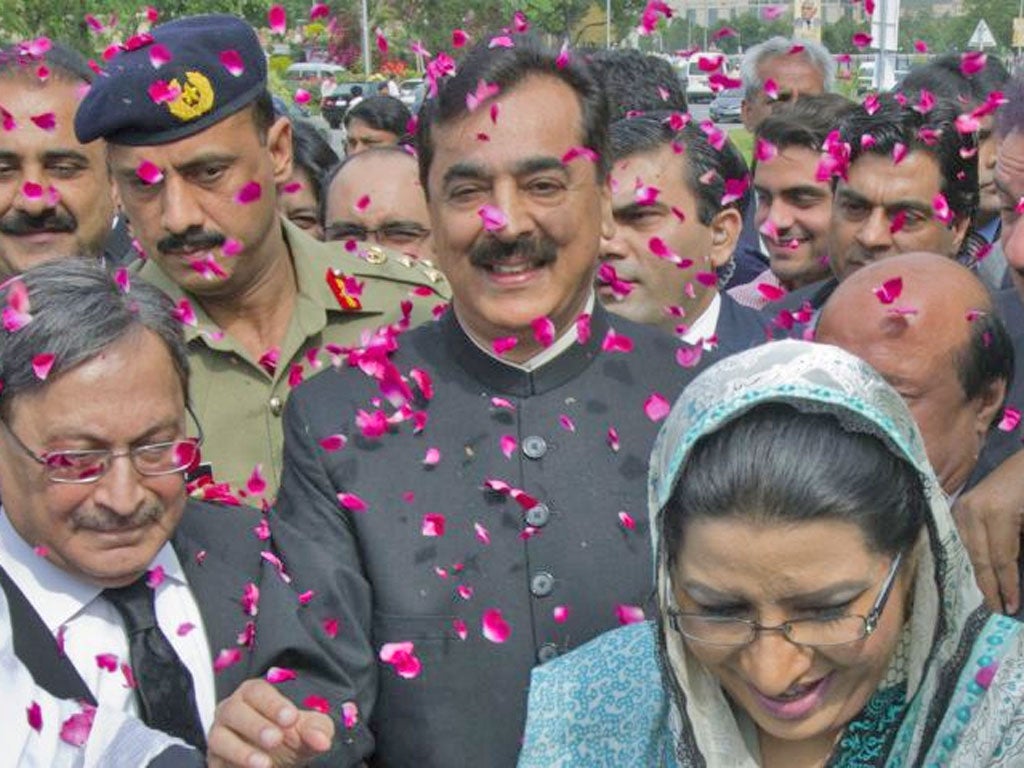Pakistan PM faces calls to resign after avoiding jail for contempt
Yousuf Raza Gilani gets token punishment for failing to reopen corruption investigation

Your support helps us to tell the story
From reproductive rights to climate change to Big Tech, The Independent is on the ground when the story is developing. Whether it's investigating the financials of Elon Musk's pro-Trump PAC or producing our latest documentary, 'The A Word', which shines a light on the American women fighting for reproductive rights, we know how important it is to parse out the facts from the messaging.
At such a critical moment in US history, we need reporters on the ground. Your donation allows us to keep sending journalists to speak to both sides of the story.
The Independent is trusted by Americans across the entire political spectrum. And unlike many other quality news outlets, we choose not to lock Americans out of our reporting and analysis with paywalls. We believe quality journalism should be available to everyone, paid for by those who can afford it.
Your support makes all the difference.Pakistan's prime minister lived to fight another day yesterday after he was found guilty of contempt by the country's highest court but escaped jail and automatic disqualification from office.
After months of tension that had gripped the political establishment, Yousuf Raza Gilani walked into the supreme court past supporters to learn that while he had been convicted by the bench, he would suffer only a token punishment. He was detained until the court rose, which it did seconds later. He could have been jailed for six months.
Supporters of Mr Gilani and the Pakistan People's Party (PPP) will be relieved he got off so lightly, but opponents said that having been convicted he should stand down immediately.
Former prime minister Nawaz Sharif, who heads the rival party Pakistan Muslim League-N, said on Geo News: "He should step down without causing further crisis. The court verdict is based on truth and reality. It must have punished the prime minister with a heavy heart, but [he] himself is to be blamed."
Former cricketer Imran Khan, of the Pakistan Tehreek-e-Insaf, said on Twitter: "After SC judgment PM has lost whatever shred of legal & moral authority he had. He must resign immed."
While Mr Gilani could face further legal actions, there seems little prospect of him going easily, and yesterday he went on to chair a meeting of the cabinet which backed him. His lawyer, Aitzaz Ahsan, told reporters he would file an appeal. "The charge was of disregarding the court, but the prime minister was sentenced for scandalising the court," said Mr Ahsan.
According to The Express Tribune, Mr Gilani appeared relaxed at the cabinet meeting and told colleagues that politics had its ups and downs.
Lahore-based analyst Raza Rumi, said: "It is unlikely the PM will step down until the appeal is settled. The court has not disqualified him, which involves a legal procedure, and it may take up to four months to complete. However, there is increased pressure from media and the opposition for him to step down. Pakistan's political uncertainty will hamper its foreign policy and more importantly the economy."
The charge brought against Mr Gilani in January by a resurgent supreme court, related to his failure to ask the Swiss authorities to reopen a decades-long corruption investigation into the actions of now president Asif Ali Zardari and his late wife, Benazir Bhutto.
Thousands of corruption cases were thrown out in 2007 by an amnesty law passed under former military president Pervez Musharraf, which paved the way for a return to civilian rule. Two years later, the court ruled that agreement to be illegal, and ordered cases involving Swiss banks against Mr Zardari to be reopened. Mr Gilani insisted Mr Zardari enjoyed immunity as head of state.
The PPP said that the supreme court was acting beyond its jurisdiction. Others said that the court was asserting its independence.
Join our commenting forum
Join thought-provoking conversations, follow other Independent readers and see their replies
8Comments